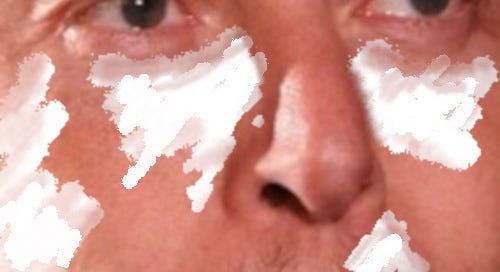Memo: Vestimentary Requirements for Clown Staff during Public Engagements
[Vesti la giubba, II]
There’s a perverse economic theory of concert- and opera-going known as Baumol’s Dilemma: you see, concert houses and opera houses are structurally set to fail because, when inflation hits and the costs go up, there’s no way to make the musicians and the singers more productive. You might be able to get more trills-per-minute from Julia Lezhneva; and I’m pretty sure someone some day will beat Egon Petri’s record for playing the Minute Waltz in 30 seconds or less. By the lights of traditional economics, says Baumol, it’s a losing proposition.1
As Marx would have said of Hegel if Marx had known cars instead of cameras, Baumol grasps the economic world as it is, except in reverse gear: Baumol’s Dilemma is a solution claiming to be a problem, an effect pretending to be a cause. Trained musicians may not be in a position to play faster, but like teachers and writers they’re forced to work longer hours if you pay them less and less. Baumol’s unspoken goal is to make the situation seen inevitable, and the system of opera-houses and concert-houses is designed to do just that. Not my theory alone, the composer William Schuman, the first head of Lincoln Center in Manhattan, made a similar observation: there was no way places like the Metropolitan Opera were going to break even, not breaking even was their raison d’être: “Basic to our problem is not that our deficits are too large, but that they are too small.” I quoted Schuman elsewhere on this, many years ago. He understated the case.2
And this is what I like about Paul Krugman: he’s not inductive; in this he’s closer to Marx than to Hegel but hey, you MAGAs, you knew that. He’s not afraid to step away from Theory in the face of economic facts. And I noticed a similarity between his discussion of the likelihood of Tesla’s collapse, and the dilemma driving the Metropolitan Opera in New York. Is Tesla the Metropolitan Opera House of cars, or is the Metropolitan Opera the Tesla of opera houses?
First, there is an obvious similarity: Tesla cars and Met productions are niche items whose status depends on technology. The Metropolitan Opera, when it opened, was a state-of-the art marvel, so much so that much of its stage gadgetry has rarely been used and is most likely obsolete. Neither Tesla nor Turandot can keep their advantage except through technology, and in the case of opera productions this means the Met has no leeway to reduce its dependence on the costs of technology: as in Hollywood movies and Las Vegas light shows, technology is inseparable from the production values that define quality. Most likely you will never see a “Konzertante” production of an opera at the Met, in which the performers walk in and out and sing in front of their music stands: these productions don’t cost enough; any college music department can put one on.
Krugman’s second point’s more challenging. He asks why Tesla was ever worth so much to begin with:
“The answer, as best as I can tell, is that investors fell in love with a story line about a brilliant, cool innovator.”
Well, maybe there’s another reason: Tesla (the stock) seemed to be worth so much because Tesla (the car) costs so much. This is counterintuitive from an economist’s point of view. The tried-and-true story is of Henry Ford, whose Model T was successful because it was produced en masse for the masses. Just as Elon’s more of a diva than a CEO, the Kathleen Battle of cars, so in many ways Tesla’s more like an opera company than a manufacturer of cars: it sells exclusivity. I can’t speak for Tesla; but for the Met to reduce their prices, or to make themselves more accessible, would be the beginning of the end: “The consumer is really worshiping the money that he himself has paid for the ticket.” And who wants to see their gods depreciated?
“It can be asked,” writes Adorno,
“whom music for entertainment still entertains. Rather, it seems to complement the reduction of people to silence…”3
Many, many years ago, on a warm summer night, I sat in Lincoln Center listening to a faraway flute player somewhere in the trees. That was before the guards started shooing us away, the flutists and the others, to make room for the music. There are many things for which I can forgive the Met. Silencing that solitary flute player is not one of them.
WOID XXII-50
William J. Baumol and William G. Bowen, Performing Arts, the Economic Dilemma; a Study of Problems Common to Theater, Opera, Music and Dance (Cambridge, MA: M.I.T. Press, 1968).
see William Schuman, The New Establishment. An address at the Princeton University Conference on “The Performing Arts: The Economic Problems,” December 9, 1966 (Princeton: Princeton University Press, 1966); Paul Werner, Museum, Inc: Inside the Global Art World (Chicago: Prickly Paradigm Press, 2005), p. 72.
Theodor Adorno, “On the Fetish-Character in Music and the Regression of Listening,” in The Essential Frankfurt School Reader, ed. Andrew Arato and Eike Gebhardt (New York: Urizen Books, 1978), pp. 278, 271.






Memo to Paul Krugman:
Darling, Thorstein Veblen is so 2022...
https://www.nytimes.com/2022/12/30/opinion/elon-musk-tesla-democrats.html